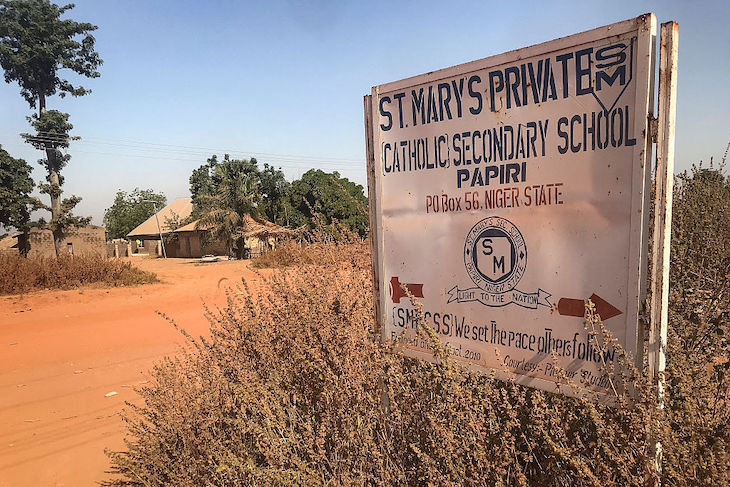The kidnapping of over 300 students and teachers from a Catholic school by armed men in the Papiri area of central Nigeria is one of the worst mass abductions the country has ever witnessed. The horrifying incident on Friday is far from isolated: more than 2,500 students have been taken in at least 70 raids on schools in the last decade. The St Mary’s School attack came in the same week that gunmen killed a teacher and abducted 25 students from a girls’ secondary school in Nigeria’s Kebbi State.
More than 2,500 students have been taken in at least 70 raids on schools in the last decade
While no one has claimed responsibility for either attack, Nigeria is currently witnessing militant threats from a gamut of non-state actors, ranging from jihadist outfits, to ethnic militia, to independent criminals locally known as bandits. Abducting schoolchildren has been a tactic deployed by numerous armed groups over the past decade, prompting Nigeria to launch a Safe School Initiative (SSI) in 2014. But over a decade on since the launch, schools remain a target. In the wake of the most recent incident, the government’s response has been to close all schools in Niger state. It’s a quick fix which means that children miss out on their education – and it does little to address the real problem.
These abductions are often motivated by a bid to persecute religious minorities, such as Nigeria’s increasingly vulnerable Christian population. But they are also fuelled by something more straightforward: the lure of ransom payments. Nigerians have paid kidnappers over $20million (£15.2million) since 2014. In an effort to curtail the abductions, the government passed a law in 2022 banning ransom payments. However, the kidnappings have continued: 4,722 abductions have been reported between July 2024 and June 2025 and the ransom payments have not stopped as desperate families try to secure the release of their loved ones.
Where bandits might have spearheaded Nigeria’s abduction epidemic, they have been inspired by, and seek to imitate, radical Islamists like the region’s most menacing jihadist outfit, Boko Haram. The group’s operational focus on schools since its inception was made evident when it coined its name which translates into ‘western education is forbidden’; it underscored why it has frequently targeted religious minorities and educational institutions, both of which it deems to be ideologically deviant.
The most notorious incident involving Boko Haram took place in 2014, when 276 Chibok schoolgirls were snatched, at least 90 of whom remain missing. With Boko Haram frequently demanding, and receiving, ransom money to fund its initial expansion in the region, the outfit has provided a blueprint to the bandits that have over the years allied with radical Islamists, often taking money to carry out raids commissioned by jihadist groups. That’s why Nigeria’s Christians haven’t just faced attacks by Boko Haram, and the Islamic State in West African Province, but also bandits and Muslim ethnic militia such as the Fulani militants. Last week, gunmen raided a church in Eruku town in Nigeria’s Kwara state kidnapping worshippers, and the pastor. The growing number of attacks aimed at the local Christian community has prompted US president Donald Trump to condemn Nigeria for allowing persecution of Christians in the country, with the US listing it as a ‘country of particular concern’ this month.
Militants, however, remain emboldened enough to target Christians, thanks to the Nigerian government’s denial that any persecution against the community exists. Nigeria’s denialism is further fanned by Western media’s apologia for Islamist brutalities founded upon the assertion that the country’s Muslims too are killed in high numbers. Not only does this dangerous narrative betray ignorance with regards to the modus operandi of jihadists like Boko Haram – that endeavour to covert Muslims that are not ideologically aligned, while aspiring to erase non-Muslims – it naturally leaves Christians more vulnerable to a threat that is aimed explicitly at them.
At least 50,000 Christians have been killed and 18,500 abducted in Nigeria since 2009, with over 20,000 churches and Christians schools attacked in the country. In addition to the obvious Islamist intent behind targeting Christian gatherings and worship places, there are multiple reports of Christians who have been kidnapped after they were specifically asked their religious identity. The majority of Chibok schoolgirls kidnapped in 2014 were Christians. And it seems unlikely to be a coincidence that St Mary’s School, where the latest mass kidnapping unfolded last week, is a Christian institution.
As Nigeria’s Christians and schoolchildren live in fear, the country’s government plays down the problem – and the west turns a blind eye.







Comments